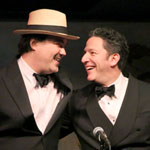Alix Cohen’s Soapbox
Use the Time to Plan a New Show?
April 27, 2020
By Alix Cohen

Are you listening to music while confined, perhaps watching performance videos? If you’ve been thinking of creating a new show, perhaps now is the time to do some research. Feedback and music resources are a click away. Whether eventually realized or done as an exercise, this will keep your mind, imagination, voice, and/or instrument fresh.
A wealth of what’s out there is ripe for harvest. Get out of your familiarity rut. Listen to music in other genres, from other eras. Arrangements can be altered. Remember to consider your vocal strengths.
Choice of material is paramount. If possible, a good performer chooses something meaningful to him/her in real time; it makes a difference. Sharing is part of what cabaret is about. Even salutes to songwriters or performers should come out of your personal relationship to them and/or their songs.
There are lyrical thoughts and feelings that you might not yet have the experience to communicate, no matter how fine a vocalist you are. Don’t “Guess Who I Saw Today?” and “Here’s to Life!” land more authoritatively when they are performed by Marilyn Maye? Though love itself is universal, “The Man That Got Away” is problematic coming from a 19-year-old.
Are you stylistically able to handle your choices? Not every singer can make dropped “Gs” sound authentic, handle a western lilt, or effectively scat.
Interpretation is personal. It’s possible to retain the integrity of a lyric and change the tone of its meaning, but skewing differently for novelty’s sake almost never works. Successfully recalibrating material is more likely if you’re aware of context. When did it first see the light? What did it sound like then? What were social mores at the time? If the song is from a musical, what was the defining moment? The best abstract visual artists began as realists.
Think about the structure of a show. What do you want to say overall? Does the patter work? Why not? Too much, too little, not sufficiently related to material, to you? This is one of the most difficult components for cabaret performers to get “right.” Asking help from a writer, a discerning director, or a pair of objective ears is a good idea. Sometimes there’s next to no monologue, at other times it’s personal, anecdotal, or historical. The latter, by the way, does not mean a list of facts. Do some research; make it entertaining. Andrea Marcovicci was one of cabaret’s great authors during her Algonquin reign. Mark Nadler’s last few shows have been immensely personal, as have Karen Akers’.
Sequencing must also be considered, both musically and theatrically. Listen to recordings. Watch whole acts if you can. Why does one song “fit” while another is jarring? Even if the show has a theme, every song should not have the same temper. Too many eleven-o’clock numbers or ballads—no matter how good—are like too much ice cream. Have the courage to take a song down in pitch when apt, instead of consistently showing off lung power.
Until you’re in a club with a performer who relates to his or her audience and you notice the effect on both, it’s just words. Practice on your housemate or even ZOOM until such time as . . .
We could have an eruption of original shows in months following club openings (hoping for the best). Regardless, process might be good therapy.





